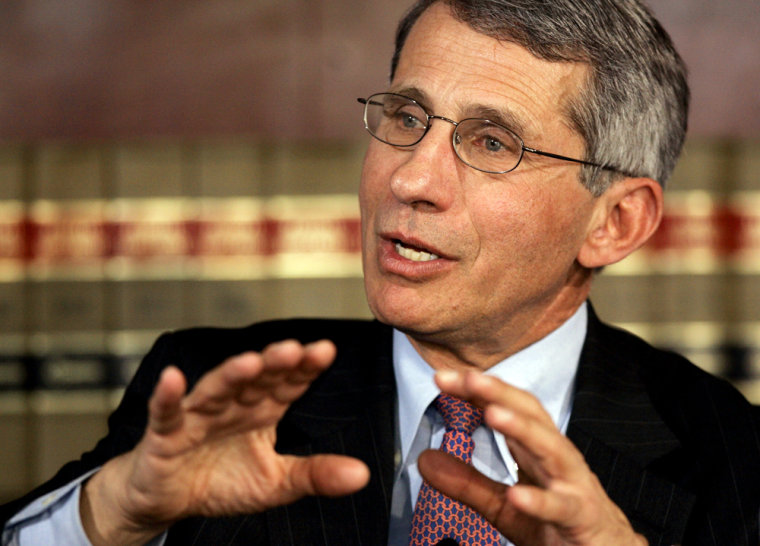People hearing the drumbeat of dire bird-flu warnings constantly ask the government’s top scientist on the topic, “How worried should we be?”
Not very — yet, answers Dr. Anthony Fauci, the National Institutes of Health’s infectious disease chief — even if the worrisome virus does wing its way to the U.S. in a migrating bird.
“One migratory bird does not a pandemic make,” Fauci said in an interview with The Associated Press Tuesday.
The government rightly is preparing for the worst, that the H5N1 strain of bird flu just might spark the next worldwide influenza epidemic, he said: “It would be unconscionable not to.”
But there’s no way to know whether the H5N1 strain of bird flu ever will undergo the series of genetic changes required before it could begin spreading from person to person.
“It is entirely conceivable that this virus is inherently programmed that it will never be able to go efficiently from human to human,” Fauci said. “Hopefully the epidemic (in birds) will burn itself out, which epidemics do, before the virus evolves the capability of being more efficient in going from human to human.”
Virus' spread to humans a 'big if'
Even if it does make the human leap — “big if,” Fauci said — that isn’t likely to happen overnight. Scientists are closely monitoring the virus for such changes, and an early warning could be if doctors or nurses caring for someone who caught H5N1 from a bird somewhere in the world in turn got sick.
The scientific uncertainty makes for public confusion that has only intensified as the spring migratory season arrives, bringing predictions that an infected bird eventually will reach U.S. shores.
But even if a migrating bird were to drop dead of H5N1 in Long Island Sound, the virus isn’t likely to make inroads here that it has elsewhere in the world, Fauci stressed.
Consider: H5N1 is known to have infected about 190 people, and killed roughly half of them, mostly in developing countries. Virtually all caught it from close contact with sick chickens, often small children or local farmers who handled not just the birds but their droppings, which contain high amounts of virus. They probably didn’t wash their hands before touching faces or preparing food, Fauci explained.
Here, few people have such intimate contact with chickens. Also, industrialized nations have more protected poultry flocks that lessen the chances of a migrating bird infecting chickens or turkeys — and commercial farmers are paid for the poultry that they must quickly kill to wipe out any H5N1 infection.
“It won’t be what you see in countries in which there is no regulation, in which there is no incentive to compensate farmers, in which the people, who are so poor, when they see their chickens are getting infected they immediately sell them or they don’t tell anybody because they don’t want them culled. That is a critical issue that is fundamentally different than what we see in Western Europe and that we will see in the United States,” Fauci said.
Bird flu already has spread to birds in so many countries that eradicating it would be difficult. But usually, as viruses adapt to spread more easily, they become significantly less virulent, he noted.
Pandemic would create tough choices
Still, if H5N1 does evolve into a human contagion, the nation will face some tough choices: It will take four to six months to brew a vaccine, and current research suggests very high doses will be needed, meaning tight supplies. Health providers caring for the sick and vaccine factory workers will get first priority.
Typically, the most vulnerable are the first vaccinated against regular winter flu — the very old, very young and chronically ill. But scientists are debating if it might make more sense during a pandemic to instead vaccinate those most likely to spread the virus.
“At the end of the day, you have a broader, more favorable, beneficial effect on society by preventing the spread by vaccinating the spreaders — not the grandpa who sits at home watching TV and doesn’t go out and spread it to anybody but is concerned about it coming into the house,” Fauci said. “There has not been a policy change in that, but it is under very active discussion.”
Today, the government isn’t watching too closely for international travelers who may have caught H5N1 from a bird before they left home, because such patients wouldn’t spread infection here. Monitoring travelers now “would be logistically a mess ... with no real justification,” Fauci said.
However, any sign that H5N1 was becoming more of a human threat elsewhere could prompt close scrutiny of travelers, with U.S. officials examining planes like they did during the 2003 outbreak of the SARS virus, or other steps.
Meanwhile, do families need to stock up on supplies? Only like you would anyway for a hurricane or winter storm, with a little water and canned food on hand, Fauci advised. People who require regular medication for diabetes or other chronic illnesses should have an extra week or two supply, like they would for a vacation.
“That doesn’t mean going up to Costco and loading up a truck,” he said. “That’s common-sense, non-hysterical providing for an interruption in services.”
